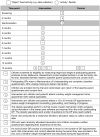A shared-care model of obesity treatment for 3-10 year old children: protocol for the HopSCOTCH randomised controlled trial
- PMID: 22455381
- PMCID: PMC3464143
- DOI: 10.1186/1471-2431-12-39
A shared-care model of obesity treatment for 3-10 year old children: protocol for the HopSCOTCH randomised controlled trial
Abstract
Background: Despite record rates of childhood obesity, effective evidence-based treatments remain elusive. While prolonged tertiary specialist clinical input has some individual impact, these services are only available to very few children. Effective treatments that are easily accessible for all overweight and obese children in the community are urgently required. General practitioners are logical care providers for obese children but high-quality trials indicate that, even with substantial training and support, general practitioner care alone will not suffice to improve body mass index (BMI) trajectories. HopSCOTCH (the Shared Care Obesity Trial in Children) will determine whether a shared-care model, in which paediatric obesity specialists co-manage obesity with general practitioners, can improve adiposity in obese children.
Design: Randomised controlled trial nested within a cross-sectional BMI survey conducted across 22 general practices in Melbourne, Australia.
Participants: Children aged 3-10 years identified as obese by Centers for Disease Control criteria at their family practice, and randomised to either a shared-care intervention or usual care.
Intervention: A single multidisciplinary obesity clinic appointment at Melbourne's Royal Children's Hospital, followed by regular appointments with the child's general practitioner over a 12 month period. To support both specialist and general practice consultations, web-based shared-care software was developed to record assessment, set goals and actions, provide information to caregivers, facilitate communication between the two professional groups, and jointly track progress.
Outcomes: Primary - change in BMI z-score. Secondary - change in percentage fat and waist circumference; health status, body satisfaction and global self-worth.
Discussion: This will be the first efficacy trial of a general-practitioner based, shared-care model of childhood obesity management. If effective, it could greatly improve access to care for obese children.
Trial registration: Australian New Zealand Clinical Trials Registry ACTRN12608000055303.
Figures
References
-
- Olds T, Maher C. In: Childhood Obesity Prevention – International Research, Controversies and Interventions. O’Dea J, Eriksen M., editor. Oxford: Oxford University Press; 2010. Global trends in childhood overweight and obesity in developed countries.
-
- Hiscock H, Roberts G, Efron D, Sewell JR, Bryson HE, Price AMH, Oberklaid F, South M, Wake MA. Children Attending Paediatricians Study: a national prospective audit of outpatient practice from the Australian Paediatric Research Network. Med J Aust. 2011;194(8):392–397. - PubMed
Publication types
MeSH terms
LinkOut - more resources
Full Text Sources
Medical


